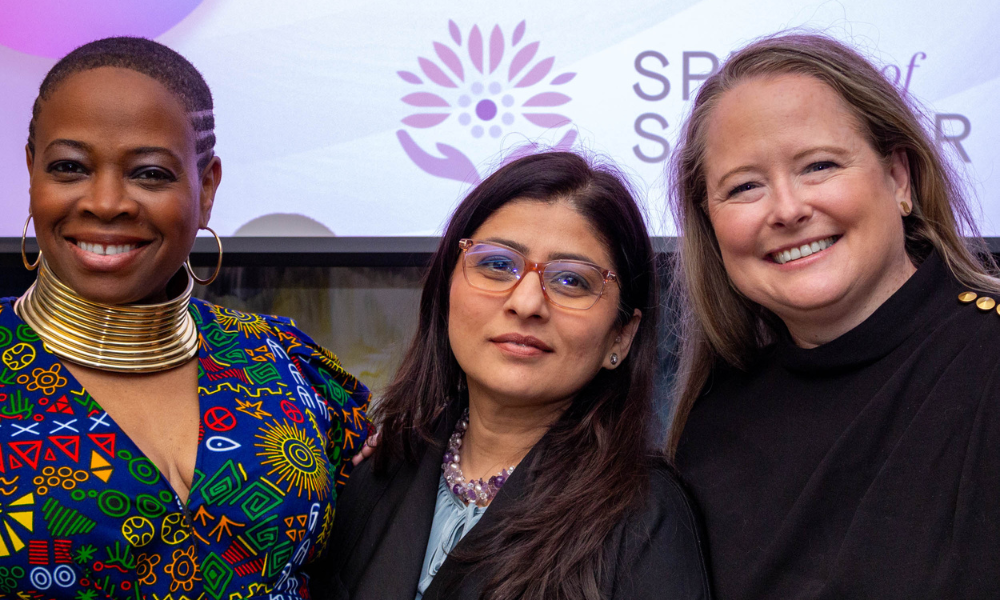
Kirsten Mercer and Carla Neto are the 2024 Sprit of Schlifer Award winners

The Barbra Schlifer Commemorative Clinic has announced the 2024 Sprit of Schlifer Award recipients. Deepa Mattoo, the clinic’s executive director, says the announcement comes as the clinic faces the ongoing challenges of housing and access to justice crises, rising femicide, and a dearth of legal aid funding, which is creating an inadequate supply of lawyers working with marginalized women and gender-diverse people.
The winners are Kirsten Mercer, a litigator and employment and human rights lawyer at Goldblatt Partners, and Carla Neto, executive director of Women's Habitat of Etobicoke. The recipients impact the people the clinic works with “on a daily basis,” says Mattoo. For example, Mercer was involved in the Culleton, Kuzyk & Warmerdam (CKW) Inquest, which probed the murders of three women in Renfrew County, Ont. Mattoo says that Neto was instrumental in getting the City of Toronto to declare gender-based violence an epidemic.
The Spirit of Schlifer campaign is an annual fundraising drive. This year’s fundraising goal, she says, is $200,000.
Mercer began her career doing justice advocacy work in the NGO sector before attending law school. She was a litigator on Bay Street, then served as senior advisor for justice policy, women’s initiatives, and labour for the Premier of Ontario. Mercer was among the policy architects of the 2015 Sexual Violence and Harassment Action Plan. She was later chief of staff to the Attorney General of Canada and an adjudicator at the Canadian Human Rights Tribunal. Now, at Goldblatt Partners, a union-side law firm, she handles human rights claims and employment law matters. She was recently counsel for the clinic in the Ontario Court of Appeal case, Ahluwalia v. Ahluwalia, which created a new tort of family violence.
“It's an incredible honour to have been selected to win this award,” says Mercer. “The work that I do is on behalf of incredible advocates [in the gender-based violence sector]. I represent them. I advise them. I fight for them.”
“Sometimes my clients are survivors, people who are who are either escaping violence or trying to escape violence in their intimate relationships or have experienced gender-based harm in the workplace and are trusting me to represent them,” she says. “So, to be selected as an award winner for this prize, in particular – one that has always been something that I've supported and followed and cheered on from the sidelines – was a pretty cool moment in my career.”
Mercer notes that Canada continues to have a long way to go when it comes to gender equality. This includes pay equity and the continued failure of the criminal justice system to respond to sexual and intimate-partner violence, which could involve embracing non-legal-system approaches.
“The through line… of those issues is a fundamental inequality and a misogyny that continues to exist in our society,” she says. “That misogyny is most acute for people who are racialized, for Black folks, for Indigenous folks, for older folks, and for people who live with disabilities.”
“Although we know that's the case, the tools we have at our disposal and the places where we are investing our money and our energy aren't really working to address those problems.”
Mercer says the resources need to be redirected upstream so that rather than funnelling into the criminal justice system, where the help comes too late, it addresses the problems at the root.
“When we look, as a society, at where we put our money, devote our energy, and where the resources are allocated, we're doing a lot on the downstream end. Someone's got to go up that stream and start asking questions about how it is that people are ending up in the river in the first place.”
She says that being recognized alongside Neto is an "incredible honour."
"I had the privilege of working with Carla this year as part of the successful push to have gender based violence declared an epidemic in Toronto," says Mercer. "This was one of the first things that Mayor Chow did following her election in the fall. Carla’s work on that initiative, and her work day in and day out at Women’s Habitat of Etobicoke is on the public health emergency of gender based violence."
The Barbra Schlifer Commemorative Clinic serves women and gender-diverse people experiencing violence, offering legal services and representation, trauma-informed counselling, and multilingual interpretation. The clinic was established in honour of Barbra Schlifer, who was sexually assaulted and murdered in Toronto on the day she was called to the bar in 1980.
According to Mattoo, the clinic serves around 14,000 people every year. Over the last year, she says the clinic undertook two significant special projects. The clinic launched an online tool, riseaboverisk.ca, which helps service providers assess the level of gender-based-violence risk they are dealing with when serving a female client. The tool took five years to build, and the federal ministry. Women and Gender Equality Canada, helped with funding.
The second notable special project is the clinic’s national project on the criminalization of survivors experiencing coercive control and litigation abuse. Mattoo says the clinic will provide legal supports and representation and take the service model to three different Canadian jurisdictions.
“The launch of that project was also a very significant amount of work and I'm very proud of it,” she says.